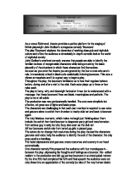Brecht designed Epic theatre to intellectually stimulate the audience and have them question the motives of the characters, inter-character relationships and the overall theme in relation to their own lives. This can often result in disgusting the audience with melodramatic gestures and obscure movements/actions, such as the disposal of the boy into the abyss in order to continue the quest that they had originally embarked upon in ‘He who says yes’. Characters presented are stereotypical and impersonal, with no individual names.
Realism positions the audience to emotionally connect with the characters and to be understanding towards their flaws, personal flaws and flaws within interaction with other characters. Realism presents a ‘slice of life’ using the fourth wall technique which involves the characters directing emotionally manipulating monologues or intense scenes towards the audience. Realistic gestures are used to portray the inner emotion of a character, such as Ben’s reaction to his sister Stacey’s death and drug addiction and his role in the unfolding events. Characters presented are not stereotypical.
The use of Elements of Drama, such as dramatic tension, roles and relationships and mood and symbolism, within both styles vary greatly.
Brecht’s ‘He who says Yes’ present’s stereotypical characters that have little emotion, if any, emotion. These characters often make a humorous statement about society in a clinical manner. Tension between characters and between characters and the audience is built not through emotional development but instead through speaking stage directions and movements aloud. The tension is created by the contradiction or contrast of the didactic or teaching message of this play and the powerful emotions generated by the emotional performance of the boy. The mood is very sombre and clinical, distancing the audience from the situation and preventing them becoming connected to the characters. Symbolism is another technique used to alienate the audience. The use of signs, black costumes with a painted white face and Japanese Noh Drama techniques are symbolic techniques used in Epic theatre.
‘X-Stacey’ by Margery Forde presents un-stereotypical characters that react to the numerous emotionally challenging events presented in the play in different ways. The main characters, Ben and Stacey, are not only close friends but siblings which deepens their emotional connection. The realistic characters entice the audience to believe that the interactions between Ben, Stacey and the other characters are a real life situation. This is done by employing the fourth wall technique. Tension builds between characters by the use of voice and movement to convey high peaks, such as the ‘raves’, and low peaks such as the death of Stacey by ecstasy. Interactions between the characters are realistic and symbolism is not employed to convey statements to the audience.
According to Gerhard Nelhaus, Brecht’s play ‘He who says Yes’ aims to make audiences “think about the issues that they raise, arouse capacity for action, force them to make decisions”. Although this aim is desired, Epic theatre is political theatre and only appeals to those who are politically inclined. Audiences often leave disgusted at the clinical and often intellectual symbolism used to convey the issue. Action is defiantly not aroused as the audience are too alienated to comprehend the motives behind character interactions and the only decision the audience is most likely to be left to make is wether or not to walk out of the theatre in sheer disgust or boredom.
Whereas Sue Rider quotes that realism is “theatre that takes questions and issues of real concern and treats them with respect”. Drug abuse is a pressing issue in modern society. ‘X-Stacey’ addresses this issue and presents a realistic representation of drug addiction which connects with the audience and victims of addiction.
Whether Epic or Realistic theatre, both plays deal with the issue of a person’s ability to make choices and accept the consequences and/or the responsibilities bestowed upon them by society in direct relation to the choices made.







